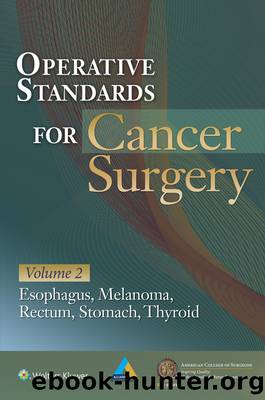Operative Standards for Cancer Surgery by Program American College of Surgeons Clinical Research;Katz Matthew;

Author:Program, American College of Surgeons Clinical Research;Katz, Matthew;
Language: eng
Format: epub
Publisher: Wolters Kluwer
Key Question: Local Excision
In patients with early rectal cancer, does local excision affect recurrence, survival, and quality of life relative to proctectomy?
INTRODUCTION
Like so many issues in the management of rectal cancer, the most appropriate treatment of early stage tumors continues to be controversial185â187 and sometimes even contentious. For patients with early rectal cancer, both local excision and proctectomy are accepted treatments, but the precise indications and the relative trade-offs for any given patient may be difficult to evaluate.188,189 On the one hand, proctectomy assures a wide surgical margin and provides for excision and histopathologic examination of the mesorectal lymph nodes.190 Patients may be staged with confidence and receive adjuvant therapy as appropriate. Further, the risk of local recurrence should be exceedingly small in the setting of early stage disease, thereby simplifying posttreatment follow-up and surveillance.191
However, proctectomy is a major abdominal operation with potential for perioperative morbidity or need for temporary or permanent intestinal stoma. There is an appreciable risk for anastomotic leak or adverse functional outcomes that may transform the temporary fecal diversion into a lifelong ostomy. Quality of life can be affected with urinary, sexual, and bowel dysfunction.157 Laparoscopic and robotic approaches along with advanced sphincter-saving techniques have reduced the short-term impact of surgery and have decreased the rate of permanent colostomies; however, it seems inappropriate to describe a proctectomy as âminimally invasive,â irrespective of the access approach chosen for radical excision, considering the incidence of potential functional impairments.
In comparison with proctectomy, local excision is associated with a lower incidence of major complications and less short- and long-term disability.192 Newer transanal endoscopic surgical approaches to local excision (e.g., TEM or TAMIS with the use of conventional laparoscopic instrumentation through a transanal access port) have made TAE far more precise with less fragmentation of the surgical specimen and have decreased the rate of local recurrence relative to standard TAE.85,133â140 The rectal reservoir is preserved, yielding a superior functional outcome. However, one must acknowledge the very real risk of occult positive lymph nodes, resulting in undertreatment, because of both incomplete resection and missed opportunity for referral for adjuvant therapy.193,194
An alternative approach to decrease the risk or impact of undertreatment is to incorporate adjuvant or neoadjuvant chemoradiotherapy when tumors are identified as high-risk early cancers.184,195â199 However, the oncologic efficacy of this approach remains uncertain, and adjuvant and/or neoadjuvant therapy may substantially increase the complication rate associated with local excision as well as impair functional outcome.200â202 Furthermore, the risk of local recurrence is higher with local excision than with proctectomy, resulting in the need for more frequent and potentially costly follow-up.145,203
Based on these concerns, we sought to address the following overarching question: In patients with early rectal cancer, does local excision affect recurrence, survival, and quality of life relative to proctectomy? A systematic review of the published literature was performed with the aim of answering the following specific questions:
1. Compared with patients who undergo radical excision of rectal adenocarcinoma, do patients who undergo local excision experience fewer postoperative complications?
2. Compared with the resected
Download
This site does not store any files on its server. We only index and link to content provided by other sites. Please contact the content providers to delete copyright contents if any and email us, we'll remove relevant links or contents immediately.
Governing Habits: Treating Alcoholism in the Post-Soviet Clinic by Eugene Raikhel(272)
TSRA Operative Dictations in Cardiothoracic Surgery by unknow(239)
The Rosetta Stone of the Human Mind by Vincenzo R. Sanguineti(203)
Cardiology in a Heartbeat, second edition by Vaswani Amar;Khaw Hwan Juet;El-Medany Ahmed;Dougherty Scott;(201)
The Trauma Chronicles by Westaby Stephen(174)
How Selegiline ((-)-Deprenyl) Slows Brain Aging by Joseph Knoll(172)
Lymphedema (Lymph Obstruction), a Simple Guide to the Condition, Diagnosis, Treatment and Related Conditions by Kenneth Kee(170)
Clinical Nephrology - 2020 by Weber MD C. G(169)
If Joan of Arc Had Cancer : Finding Courage, Faith, and Healing from History's Most Inspirational Woman Warrior by Janet Lynn Roseman(169)
Dear Millie: Diary of a seven year old with cancer by Marco Previero(163)
The Heart Health Bible by John M. Kennedy(163)
Community Engagement, Organization, and Development for Public Health Practice by Murphy Frederick;Frederick Murphy Msphyg Mpia;(157)
Fast Facts: Skin Cancer by unknow(157)
Rethinking Evidence in the Time of Pandemics: Scientific vs Narrative Rationality and Medical Knowledge Practices by Eivind Engebretsen Mona Baker(152)
Restful Insomnia by Sondra Kornblatt(151)
Home and Dry by Birgit Bulla(144)
Fibromyalgia--Your Treatment Guide by Christine Craggs-Hinton(143)
The Plague of 1665 by Emma Laybourn(142)
What Your Doctor May Not Tell You About Cholesterol by Stephen R. Devries & Winifred Conkling(137)
